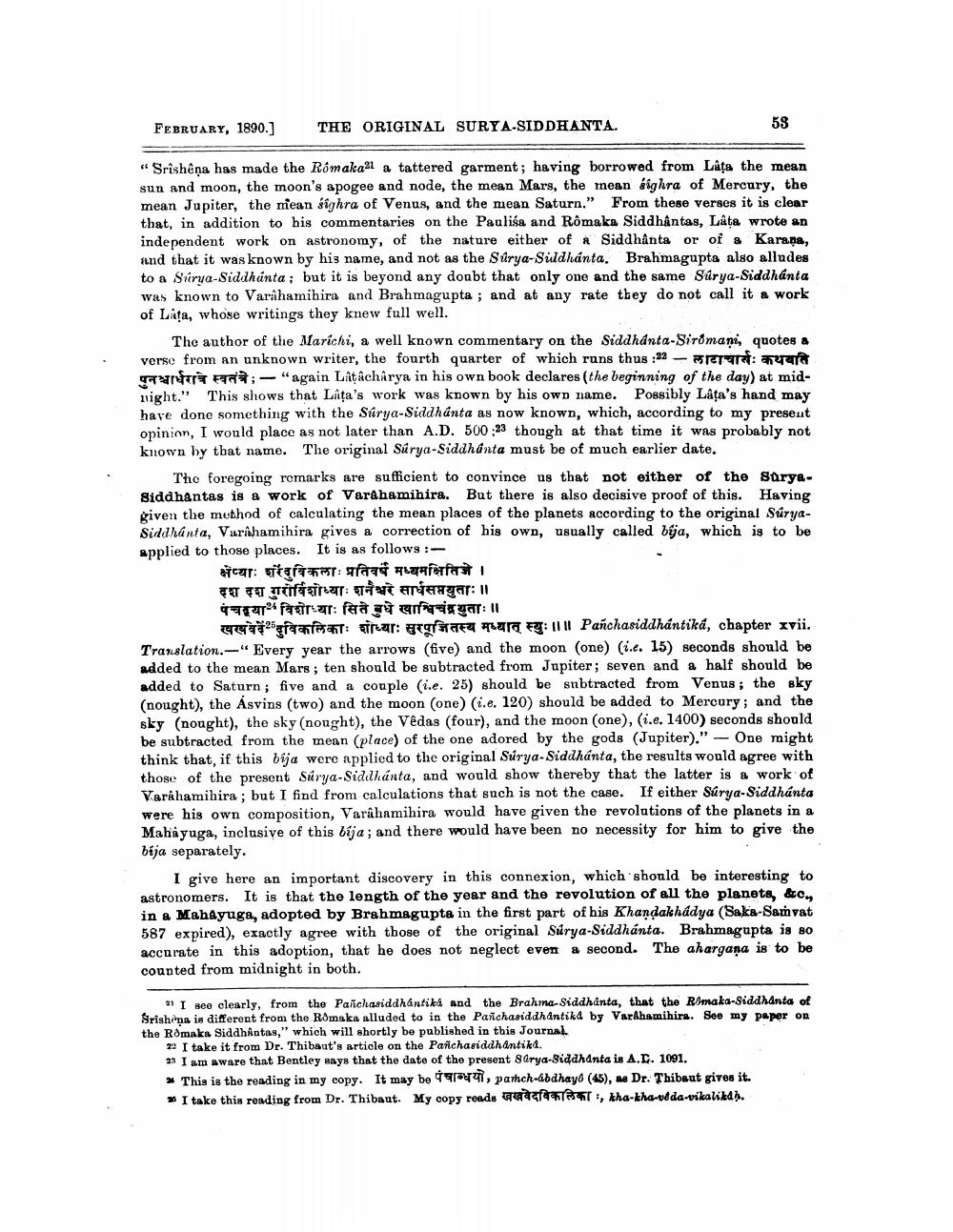________________
FEBRUARY, 1890.)
THE ORIGINAL SURYA-SIDDHANTA.
53
T
"Srishêņa has made the Rômaka21 a tattered garment; having borrowed from Lata the mean sun and moon, the moon's apogee and node, the mean Mars, the mean bighra of Mercury, the mean Jupiter, the niean sighra of Venus, and the mean Saturn." From these verscs it is clear that, in addition to his commentaries on the Paulisa and Rômaka Siddhantas, Lata wrote an independent work on astronomy, of the nature either of * Siddhanta or of a Karana, and that it was known by his name, and not as the Súrya-Siddhanta. Brahmagupta also alludes to a Srirya-Siddhanta ; but it is beyond any doubt that only one and the same Súrya-Siddhanta was known to Varihamihira and Brahmagupta ; and at any rate they do not call it a work of Lata, whose writings they knew full well.
The author of the Marichi, a well known commentary on the Siddhanta-Siromani, quotes a verse from an unknown writer, the fourth quarter of which runs thus :22 - Tar:
E ; - "again Latâcharya in his own book declares (the beginning of the day) at midnight." This shows that Lâța's work was known by his own name. Possibly Lata's hand may have done something with the Súrya-Siddhanta as now known, which, according to my preseut opinion, I would place as not later than A.D. 500:23 though at that time it was probably not known by that name. The original Súrya-Siddhanta must be of much earlier date.
The foregoing remarks are sufficient to convince us that not either of the SuryaSiddhantas is a work of Varahamihira. But there is also decisive proof of this. Having given the method of calculating the mean places of the planets according to the original SúryaSiddhanta, Varahamihira gives a correction of his own, usually called bea, which is to be applied to those places. It is as follows:
car: grafa festi दश दश गुरोविंशोध्याः शनैश्चरे सार्धसप्तयुताः॥ TTTTTTTrr: feat U yar: 11
un gferanfeat: nar: urmarea ar fy: 1111 Panchasiddhantikd, chapter xvii. Translation. -"Every year the arrows (five) and the moon (one) (ie. 15) Seconds should be added to the mean Mars; ten should be subtracted from Jupiter; seven and a half should be added to Saturn; five and a couple (i.e. 25) should be subtracted from Venus ; the sky (nought), the Asvins (two) and the moon (one) (i.e. 120) should be added to Mercury; and the sky (nought), the sky (nought), the Vedas (four), and the moon (one), (i.e. 1400) seconds should be subtracted from the mean (place) of the one adored by the gods (Jupiter)." - One might think that, if this bija were applied to the original Súrya-Siddhanta, the results would agree with those of the present Súrya-Siddhánta, and would show thereby that the latter is a work of Varahamihira; but I find from calculations that such is not the case. If either Súrya-Siddhanta were his own composition, Varahamihira would have given the revolutions of the planets in a Mahayuga, inclusive of this bija; and there would have been no necessity for him to give the bija separately.
I give here an important discovery in this connexion, which should be interesting to astronomers. It is that the length of the year and the revolution of all the planete, &c., in a Mahayuga, adopted by Brahmagupta in the first part of his Khandak hádya (Saka-Samvat 587 expired), exactly agree with those of the original Súrya-Siddhanta. Brahmagupta is so accurate in this adoption, that he does not neglect even a second. The ahargana is to be counted from midnight in both.
" I seo clearly, from the Pastchasiddhantika and the Brahma-Siddhanta, that the Rimaka-Siddhanta of Srishna is different from the Romaka alluded to in the Panchasiddhantikd by Varahamihira. Soo my paper on the Romaka Siddhantas," which will shortly be published in this Journal
12 I take it from Dr. Thibaut's article on the Parichasiddhantika. 23 I am aware that Bentley says that the date of the present surya-Siddhanta is A.L. 1091. » This is the reading in my copy. It may be 2 , parch-abdhayo (45), Dr. Thibaut gives it. » I take this reading from Dr. Thibaut. My copy reads
Test:, kha-kha-udda-vikalikdh.




